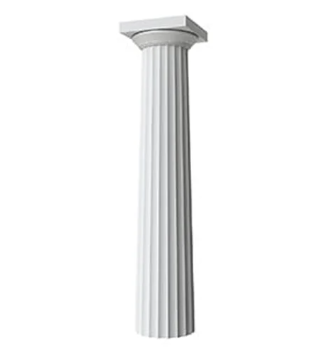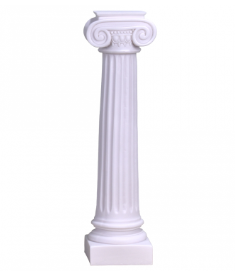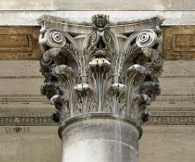Greek Culture/Hellenistic Period Study Guide
1/68
There's no tags or description
Looks like no tags are added yet.
Name | Mastery | Learn | Test | Matching | Spaced |
|---|
No study sessions yet.
69 Terms

Doric Columns
Columns lack bases and are relatively simple in design

Ionic Columns
Columns have bases volutes (the spiral decoration at the top of the column)

Corinthian Columns
Includes bases, more elaborate detail on the column itself, and feature more elaborate volutes, often in a floral style
Vases
Served as basic storage, but was also considered art and used for storytelling
Two Major Vase Styles
1. Black-figure
2. Red-figure
Greek Art
Vases, life-like sculptures, etc. All art depicts arete
Women’s Role
To be a wife and a mother
Herodotos
The father of history, gullible but some believe this was intentional, giving him the name “father of lies”
Xenophon
Finished the History of the Peloponnesian War, the Anabasis
The Anabasis
10,000 Greek soldiers fought their way from the center of Persia to the Black Sea.
Theater at Epidauros
Greek theater with such pure acoustics that it is still used today
Artemis
Goddess of the moon and of the hunt. Hunted and remained childless (neither of which was typical of Greek women did)
Athena
Goddess of wisdom and war (neither war or being childless was what typical Greek women did
Hera
Goddess of marriage. Perfect Greek wife for being a mother and a wife, and putting up with Zeus’ shenanigans
Greek Theater Genres
Tragedy and Comedy (Tragedy was more popular)
Aristophanes
Made plays that poked fun at politicians. Wrote Lysistrata
Metaphysical
Abstract thought or subjects, meaning of existence, or truth
Sophists
Philosophers esteemed for their wisdom
Socrates
Philosopher who questioned almost everything. Created the Socratic method (“but why?”). Killed with hemlock for corrupting the youth
Plato
Socrates’ student who created the Republic and founded the Academy.
Republic
Plato’s perfect idea of a government, where people were ruled by educated elites and by a philosopher king
The Academy
A prominent school of Plato’s, also where the word “academy” comes from
Aristotle
Plato’s student, taught Alexander the Great, created classification systems, philosopher who studied the intended purpose of things.
Diogenes
Famous for showing his disdain for people he didn’t agree with in a crude manner
Epikouros
You should enjoy the time you have and life life to he fullest. Pleasure and comfort are good. “Yolo”
Zeno
Founder of Stoic philosophy. The idea of not embracing the highs or lows in life. “Zen”
Stoic Philosophy
Don’t embrace the highs and lows of life, leading a modern path. Much like Buddhism
Cynics
Reject all social norms. “To behave like dogs”
Pithos
“Tub”
Aeschylus
Wrote Aiskhylos
Thebes’ Issue
In one battle, Thebes’ loses the top 5 people in their government, and the top 4 successors of the throne.
Hellenistic
“Greek like” or “Greek influenced.” The spread of Greek culture outside of Greece.
#1 Reason Macedonians are Greek
The Macedonians were allowed to participate in the Olympic games
Pella
Capital of Macedon
Philip II (political negotiations)
Threatened parents into behaving
Good at making treaties
Got married to a lot of women
Sarisa
A spear that was very long, but also heavy, so you couldn’t have a shield
Philip II (military additions)
Introduced sarisas
Brings back cavalry
Strategies that make archers, infantry men, and cavalry people fight together
Philip’s Good Faith Negotiation
Spent his time as a hostage in Thebes’ by watching the Theban’s army train
Sacred Band
Theban army of 150 pederast couples (300 men)
Isokrates
Argued that Macedonians and Philip were good for Greece
Demosthenes (wins the argument)
Argues that Philip is bad. Why would they all want to serve one master instead of staying independent city states?
Battle of Cheronea (Athens vs Macedonia)
Macedonian victory. Gets help from Alexander, who was given the prime spot of honor. Alexander gets surrounded, which in Philip’s eyes, will determine Alexander’s fate. Alexander destroys the sacred band, and is a victorious general. Philip is now the king of all of Greece
Philip’s Murder
Philip is having a relationship with a young man, and the break up doesn't go well. The young man kills Philip, and then Philip’s bodyguards kill the young man.
Battle at Granikos
Alexander defeats Persia
Issos
Alexander defeats Darius III due to phalanx and use of cavalry, and Darius flees
Alexander’s relationship with Eygpt
Egypt accepted him as a Pharaoh with open arms
Gaugemela
Alexander defeats Darius as he flees, again
Darius III’s Murder
Darius’ subordinates murder Darius in hopes that Alexander will leave Persia alone, but since Alexander believes only a king can kill a king, he takes over Persia anyways and punishes the subordinates
Alexanders Ultimate Goal
To create a multi-cultural (mainly Greek) empire through…
1- Marriage (EX. marrying Darius’ daughter)
2- Build cities (EX. Alexandria)
The Diadokhoi of 3
3 dynasties emerge after Alexander’s death:
1- Antigonids at Macedon
2- Ptolemies at Egypt
3- Seleucids at Syria (and eastern provinces)
The Success of a New Kind of Monarchy Means…
The failure of a polis or Greek City-State as a political unit
Ptolemy
Alexander’s general whose family line took over Egypt after Alexander’s death
Ptolemies Ruling Style
The ruled like Greeks while adapting incest and divine kingship at Alexandria
Ptolemy Kings
Philadelphos: “sibiling-loving”
Eurgetes: “benefactor”
Philopator: “father-loving”
Eratosthenes
Calculated the world’s circumference
Archimedes
1- Discovered water displacement
2- Invented the lever
Serapis
A hybrid deity (part Zeus, Osiris, Apis, Dionysos) that shows Egyptian and Greek merged cultures
Syncretism
“The ability to recognize Gods in other cultures”
Seleucids
Descended from Seleukos in Syria. Involved is royal incest and divine kingship
Diadokhoi of 5
Alexander’s 5 generals who fought a civil war for rule over Alexander’s land. 3 emerged and 2 died.
Major Outcome of Alexander’s Death
Rise of the monarchies (Ptolemies, Seleucids, Macedonians) causing Greek City-States to fall out
Ostentatious
“Over the top”
Antioch
City built in Syria, torn apart by war
Pergamon
People of Pergamon wanted to imitate the highest known culture, so they imitated the Greeks
Pergamon Artwork is…
Lifelike AND realistic
Aiskhylos
Wrote Persians and the Orestaia Trilogy (Agamemnon, The Libation Bearers, The Furies)
Sophokles
Wrote Oedipus Trilogy (Oedipus Rex, Oedipus Colonnus, Antigone)
Euripides
Pointed out the Gods’ flaws, wrote Medeia
Thucydides
Began The History of the Peloponnesian War